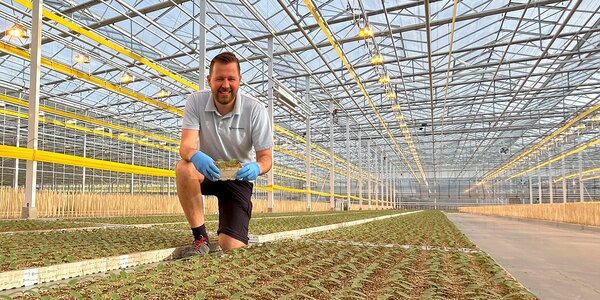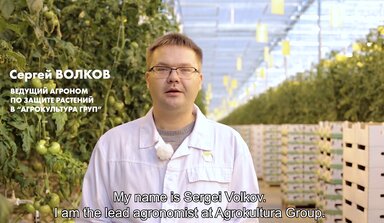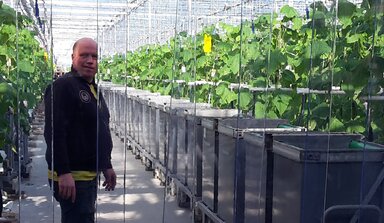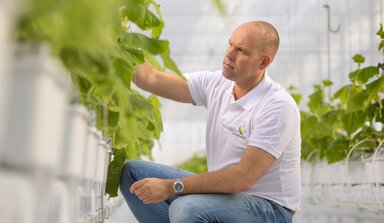Plant growers see many advantages to temporary coating with ReduFuse IR
Propagation companies go to great lengths to produce the perfect starting material for their customers. During periods of high radiation, vulnerable young cucumber plants need extra protection. ReduFuse IR from ReduSystems offers the perfect solution, which crop manager Leon van Mil from the Netherlands and Achim Gernert from Germany have discovered. This temporary coating repels infrared radiation and makes the transmitted light more diffuse, meaning their plants are subjected to less stress and grow better under extreme outdoor conditions.
Leon van Mil is the crop manager at Vreugdenhil Young Plants in De Lier, the Netherlands. The company specialises in growing summer vegetable plants and has several sites. “Cucumber plants are very sensitive to heat stress,” he explains. “From June to August, we need to provide extra protection, especially in the early propagation phases. The movable screen we use year-round - also to save energy - is not always adequate. It also reduces PAR light, which affects growth. Temporary coatings are a great solution for the hottest months, which means we need to use the movable screen less often and have a better and more stable growing climate. We now have extensive experience with this.”

Leon van Mil, Vreugdenhil Young Plants
Many products tested
In 2023, Van Mil had ReduFuse IR applied for the first time by contractor Veldhoven, also based in De Lier. In previous years, he had tested other products, including ReduSol and ReduHeat, with other crops. “When you are in the greenhouse, you can really tell that each product has a different effect,” he says. “ReduSol significantly reduces light across a broad spectrum, which is not always what we are looking for. ReduHeat allows less thermal radiation to pass through, while allowing the PAR light to shine through. That’s already much better. ReduFuse IR best approximates the desired climate: effective heat reduction and relatively high light transmission in the PAR range, while also diffusing the light. As a result, the light penetrates deeper into the crop.”
The first application took place in summer 2023 at one of the two sites with cucumber plants. “The greenhouses differ in height,” Van Mil explains. “The lower greenhouse also has less ventilation capacity, which makes climate control even more challenging. So, this greenhouse was our first choice for treatment with ReduFuse IR.”
Less need for screens
The crop manager and his plants are happy with the results, as he explained in March of the new year. “The diffusing properties are great,” he says. “Not only on sunny days. It’s actually when it’s cloudy that you really notice that this coating allows more light through than ReduSol. Combined with the improved climate, a reduced need for screens and ventilation through the vents, it also means that on average there is increased humidity and CO2 in the greenhouse and the plants have an easier time growing. This year, we are adding a new location, so we’ll be making a lot of changes to the growing plan. Our plan is to test various coatings again this year and to roll out the best one on a larger scale. The coatings used will depend on the greenhouse and its layout as well as the crops grown.”
More hot summers
Achim Gernert of Jungpflanzen Gernert GbR in Albertshofen, Germany, is also pleased with the performance of Redufuse IR. The company has propagated a wide variety of vegetable and ornamental crops for growers exclusively in greenhouses since 1992. The latest 2 ha greenhouse was constructed in 2019 and is fitted with full LED and screen systems.
The climate conditions in Albertshofen, located on the Main river, not far from Würzburg, differ from those at the Dutch Vreugdenhil, which is less than 10 km from the North Sea.
“It can get very hot here in summer, especially on the concrete floor where our plants are,” says the owner of the 9-hectare farm. “Without a coating on the roof, it can easily reach 50°C on the floor. Screens can reduce the temperature by 10 degrees, but that’s still too hot. With ReduFuse IR on the roof, we can limit it to 30°C on sunny days without using the screens. This makes a huge difference. I wouldn't want to go without it now.”
Thicker layer
With extremely hot summers becoming more frequent across Europe, Gernert does not want to cut back when it comes to coatings. In late May, early June, the cucumber department will be the first to be coated. “When we first applied ReduFuse IR seven or eight years ago, we used 13 buckets per hectare,” says Gernert. “However, summers seem to be getting more and more extreme and now we are using four extra buckets. In July/August, the departments with tomato plants will also be coated. The beauty of ReduFuse IR is that we often don't have to use screens anymore. I don’t like using the screens because it gets too humid and hot in the greenhouse. The greenhouse is noticeably cooler with ReduFuse IR, but plenty of diffused light still enters. In my experience, it’s more pleasant for plants and people alike, meaning they both perform better.”


